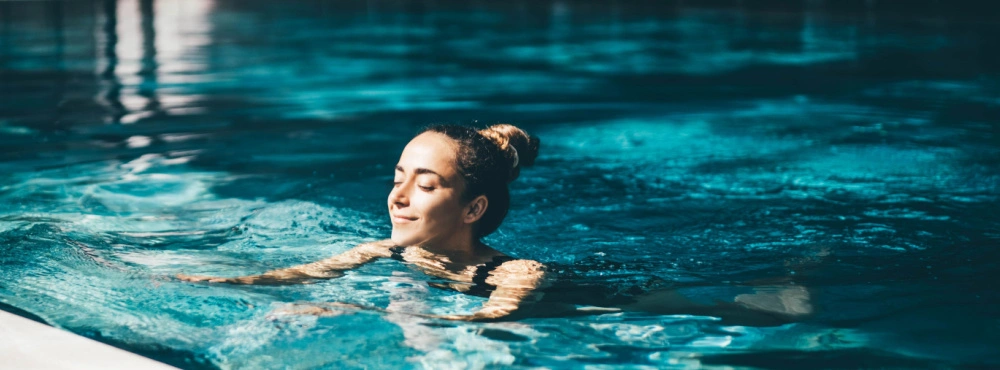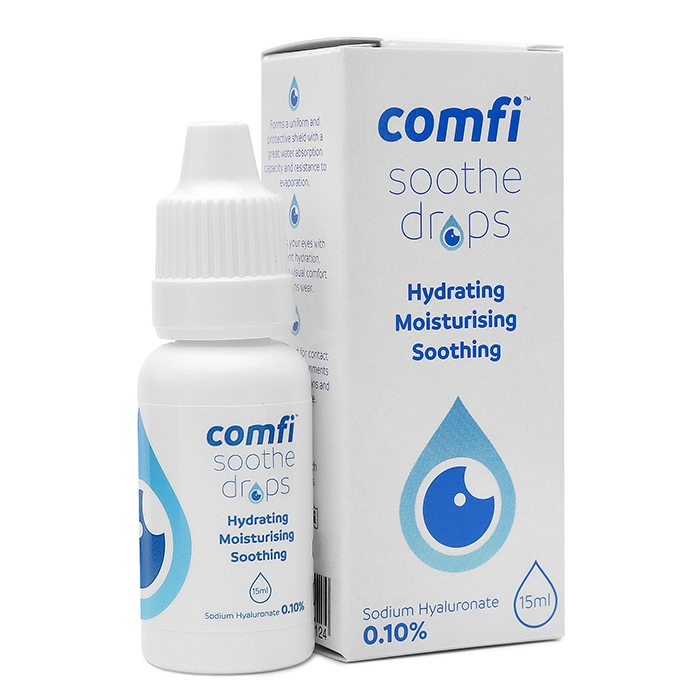Swimming can be a refreshing way to stay fit and have fun, but if you wear contact lenses, it’s important to be aware of the risks involved. Whether you're a casual swimmer or a competitive athlete participating in water sports, understanding how water can affect your lenses and eye health is crucial. This comprehensive guide explores the potential risks of exposing your contact lenses to water, offers optician-approved safety alternatives and provides handy aftercare tips to keep your eyes safe.
Risks of wearing contact lenses in water
Although contact lenses offer a comfortable and convenient way to enjoy clear vision without the need for glasses, using them for water-based activities is a big no-no. Whether you’re swimming, surfboarding or snorkelling, here are the reasons why contact lenses and swimming do not go hand-in-hand:
-
Eye infections
Contact lenses absorb water. Water bodies like pools, saunas, steam rooms, rivers, lakes, oceans and even home taps and showers are playgrounds for harmful pathogens like Acanthamoeba. Generally, Acanthamoeba organisms do not cause harm to humans. However, if they come in contact with your eyes, especially if you are a contact lenses wearer, they can cause Acanthamoeba Keratitis, an eye infection that affects the front surface of the eye and may result in permanent vision loss, if left untreated.
-
Irritation
Wearing contact lenses while swimming or playing water sports can cause irritation, as the lenses absorb pool chemicals and can cause damage to your eyes. Chlorine in pools can react with contact lenses, causing discomfort, irritation and potential eye infections. Even a splash of water could cause your lens to fold over, leading to irritation or scratching your cornea.
Types of contact lenses and relative risks
If you wonder – can I swim with contact lenses, here’s what you need to know about different types of lenses based on wearability:
-
Daily disposable lenses
For regular swimmers, the BCLA recommends discussing daily disposable lenses with an eyecare practitioner. These lenses should be discarded immediately after swimming.
-
Reusable lenses
Wearing reusable lenses while swimming is not recommended as they are more likely to trap waterborne pathogens, increasing the risk of sight threatening infections. If worn to a pool by mistake, ensure that you wash and dry your hands and remove the lenses immediately. The lenses should be discarded to avoid any risk of infection.
What to do if you are a regular contact lens wearer?
If not wearing your contact lenses is not an option for you, here are a few suggestions that you can consider, but with some key precautions:
1. Go for swimming goggles
The British Contact Lens Association (BCLA) states, “You should not use contact lenses for swimming or water sports unless you wear tight-fitting goggles over the top; ultimately, the lenses should be discarded immediately after the activity”.
2. Use daily disposable lenses
If swimming with contact lenses is unavoidable, consider using daily disposable contact lenses, as suggested by the BCLA and discard them immediately after swimming. Wearing daily lenses with water-tight swimming goggles can potentially minimise the chances of your lenses shifting or being contaminated.
3. Maintain eye moisture
Chlorine and salt water can be harsh on your eyes, even with goggles. Use eye drops before and after swimming to lubricate your eyes and reduce discomfort. They help retain moisture and decrease the likelihood of suffering from dry, irritated eyes.
5. Recognise early signs of infection
If you experience any pain, redness, irritation or blurred vision after swimming with contact lenses, remove them immediately and seek advice from an eye care professional without delay. These symptoms could indicate a serious eye infection or other issues, requiring prompt attention.
Optician-recommended aftercare
Accidents can happen. If water enters your eyes while wearing contacts, follow these steps to minimise potential complications:
1. Remove and discard lenses
Take out your contact lenses as soon as possible and dispose of them.
2. Look out for symptoms
Be vigilant for signs of infection, such as redness, pain, blurred vision, discharge or increased sensitivity to light. If any of these symptoms occur, contact your optician or healthcare provider immediately.
3. Schedule regular eye exams
Regular eye check-ups are an essential part of looking after your eyes.
What to do if your contacts get wet?
Even after taking all the required precautions, such as wearing waterproof goggles or refraining from dipping your face into the water, there is still a chance that water may seep into your contacts. If that happens, you can follow these steps:
- Step out of the water as soon as possible.
- Make sure you wash and dry your hands thoroughly.
- Remove your lenses gently and discard them.
While it may seem harmless to take a quick dip with your contact lenses in, doing so can expose your eyes to serious risks. It's important to follow the guidance of your eye care specialist and schedule regular eye health check-ups to maintain optimal vision and prevent potential issues.
Disclaimer: The advice in this article is for informational purposes only and does not replace medical care or an in-person check-up. Please check with an eyecare professional before purchasing any products or remedies. For information on our article review process, please refer to our Editorial Policy.

 Offers
Offers Account
Account
 Favorite
Favorite
 Basket
Basket

 OFFERS
OFFERS
















